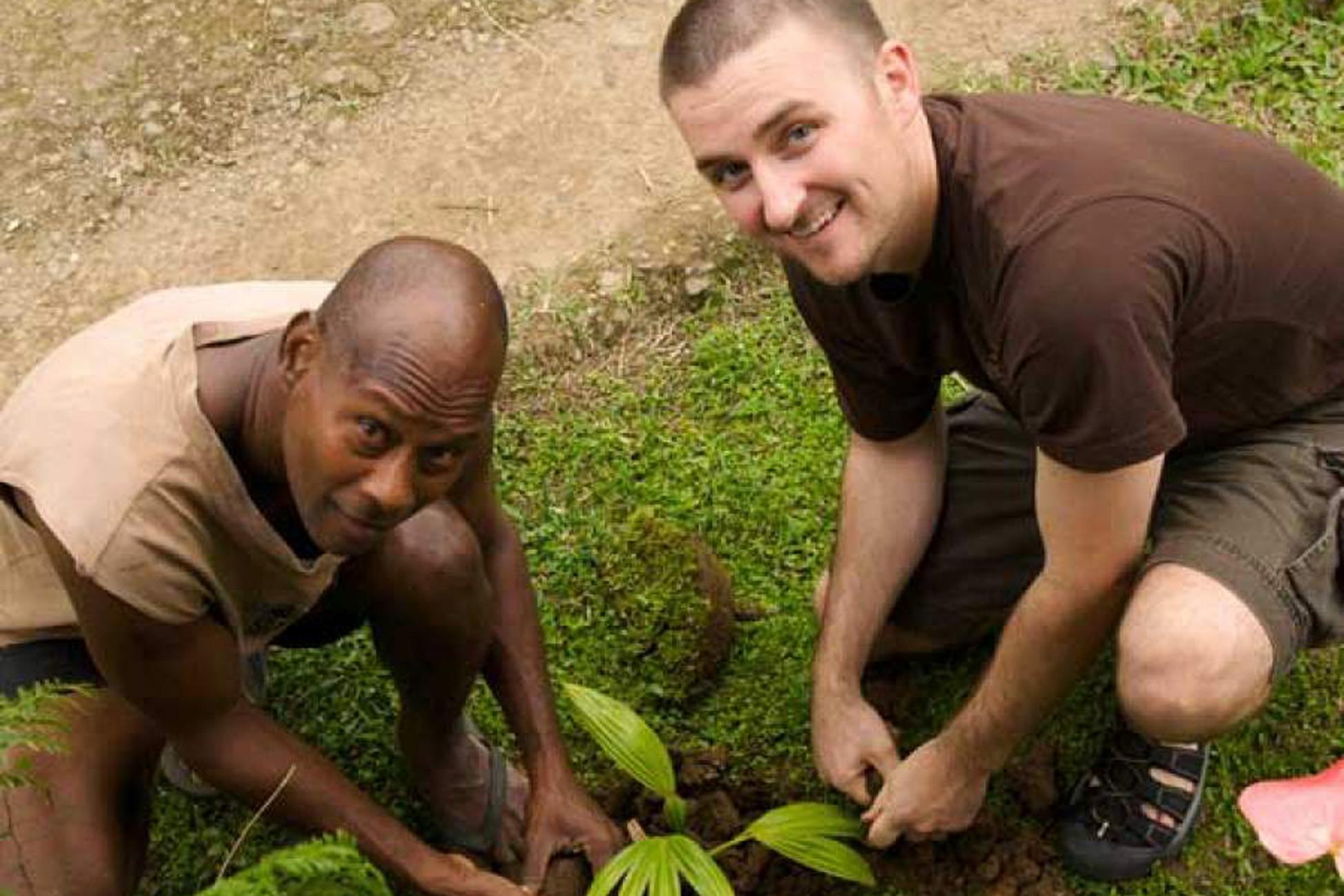When Zahara Heckscher stepped off her bus in Managua, Nicaragua, she had no idea what to expect. It was 1986, and after learning Spanish in Mexico, she was eager to start volunteering. There was only one small problem: she didn’t have a placement arranged.
“My inspiration to co-write the book was that I had so much trouble finding volunteer opportunities,” says the co-author of How to Live Your Dream of Volunteering Overseas. “Today, it’s a lot easier.”
Over the last 25 years, the landscape of international volunteerism has changed dramatically. Not only do volunteers no longer have to get on a plane to find an opportunity, but there are also placements to meet the needs of virtually any prospective volunteer. You can choose your length (a week, a month, a year or even just a day), your project focus (from basic infrastructure to policy development), your country and your departure date. With countless non-profits, social entrepreneurs and tour operators offering programmes, it’s no longer an activity reserved for idealistic university students—it seems like everyone is doing it.
It’s a far cry from international volunteerism’s humble beginnings. While missionaries and doctors have been contributing to communities overseas since the 19th century, international service didn’t progress beyond its colonial roots until the 1960s with the birth of organizations like the United States’ Peace Corps and Canada’s Canadian University Service Overseas (CUSO). But in the last decade, the field has started to grow at an unprecedented rate. It’s estimated that volunteer tourism represents somewhere between a 1.7- and 2.6-billion-dollar market, with more than 1.6 million people worldwide volunteering overseas.
“If we look over the last 10 years, we’re punctuated by 9/11, by Hurricane Katrina, by failures in our government and failures in our communities,” says Dr. Amanda Moore McBride, an associate professor at Washington University in St. Louis, whose research focuses on the impact of international service. McBride believes that the sector is growing partially due to a rise in post-secondary students participating, as well as a fundamental shift in attitudes.
“In many ways we have been awakened to contributing to the common good and helping one another,” she explains. “It’s not just about helping people that you know—it’s about how can you help people around the world.”
What began as a call to action has been institutionalized into a rite of passage. Increasingly, international service is being added to secondary and post-secondary curricula, with academic credit offered for overseas experiences. Alternative spring breaks continue to grow in popularity, with travel operators and non-profit organizations adding these week-long excursions to their roster of activities. In fact, international volunteerism has become so mainstream that during the 2011 Canadian federal election, one of the Liberal party’s campaign promises was to provide $1,500 in debt relief to students who participated in volunteerism—in Canada or on overseas volunteer trips.
But with rapid growth comes cause for concern.
“Any time you have a growth industry, you’re inevitably going to attract people who see it as a money-maker and not as, ‘I need to do the ethical thing here and have the process be about community change,’” explains Erin Barnhart, the founder of Effective Altruism, a consulting firm that supports individuals and organizations engaging in international service.
Ayako Ezaki, communications director for the International Ecotourism Society, agrees. “It’s a money-making opportunity. It’s an incentive to get as many tourists, volunteers and visitors as possible,” she says. “There have been questions about the actual impact that voluntourists are making. Is it really for the community—or is it to satisfy the needs of the volunteers?”
The field could veer dangerously into an industry based on profit—not on assistance. Even for the best-intentioned organizations, it’s a fine line between providing volunteers with an amazing experience and ensuring that the needs of the host community are met. And with volunteer placements that are now as short as one day, it’s a very fine line.
This is not a new story. The concerns raised about the influx of short-term “poverty tourists” seem endless: Children’s rights groups warn travellers that visits to orphanages are a literal guilt trip; abandoned children form bonds with volunteers, who in turn abandon them by returning home. On online message boards, volunteers complain of “make busy” work projects. (In one scenario, volunteers were asked to repaint a wall that had been painted by a previous group of volunteers—and the one before that.) And with little time to get beyond culture shock or language barriers, it’s difficult to make any substantive development contributions.
“The reality is there is a limited amount of change you can make in a short-term volunteer experience unless you have some really concrete skills,” says Heckscher.
That’s about to change. While the majority of overseas volunteers remain between the ages of 20 and 39, more individuals with experience and concrete skills are applying to programmes.
“More and more people who are working professionals, families or recent retirees are looking for a shorter-term experience,” says Barnhart. “And from the organizational side, there’s an interest in volunteers who can train local staff.”
For volunteer-sending organizations, meeting the growing demands of older volunteers is key to building sustainable programmes.
“The volunteers who are applying are more skilled than they’ve been in the past,” says Jane Baldwin, program development manager for Youth Challenge International (YCI). Two years ago, YCI launched a short-term programme targeted at young professionals, which Baldwin says was fundamental in helping to meet development goals.
“Partners are excited to have people to build capacity and to work on needs they’ve identified, whether it’s human resources, finances or information and communication technology,” she explains.
Cross-Cultural Solution’s (CCS) program manager, Stephen Thompson, has also noticed this trend, but not just from individuals or partner organizations.
“There are a lot of corporations who are looking to have these kinds of experiences,” he says. With an increased emphasis on corporate social responsibility and employee retention policies, businesses are beginning to explore the benefits of international volunteerism.
Many believe that IBM’s example will be the one to follow. In July 2008, they launched the Corporate Service Corps, a programme that allows multinational teams to address societal, environmental and educational issues. By mid-2011, more than 1,200 IBM employees had participated in the programme in more than 20 countries. IBM has since partnered with the U.S. Agency for International Development (USAID) to create the Alliance for International Corporate Volunteerism, a programme that will help small companies implement their own “corporate Peace Corps.”
Thompson, for one, is excited about this development. “There’s a great payoff for the company, and for employees it improves morale and retention,” he says. “It’s a justification of what these programmes and experiences can do.”
But the growing demand from skilled volunteers comes with its own set of challenges.
“Having one person there for six weeks who has a PhD could have amazing effects, but to be really sustainable we also want to make sure that when they leave, someone else can pick up what they’re doing,” says Thompson. For CCS, building realistic expectations is the key ingredient for a successful programme.
“Our partners aren’t expecting someone to come in with an engineering degree,” he says. “We might have younger volunteers with less work experience, but their continual presence is what’s providing those benefits that our in-country partners are experiencing.”
The possibilities for volunteering overseas seem endless. But despite the diversification of programmes and the proliferation of non-profit, government and tour operators, issues of inclusion remain.
“It is expensive,” says McBride, “and to think that you have the capacity to leave your job—the majority of our population does not have that luxury.” She worries that international volunteerism may contribute to social and economic divides, particularly as it becomes increasingly institutionalized.
This is an issue that the Building Bridges Coalition (BBC) hopes to address. Founded in 2006, the BBC is a consortium of organizations sharing best practices for the promotion and facilitation of effective international service. One of their goals is to make volunteering internationally more accessible. Organizations like the BBC will be critical in the future for establishing and maintaining effective development programmes.
For now, it remains a period of growing pains. “It’s a time of real growth and it can feel a bit disorganized,” says Barnhart. “But there are resources and thoughtful, committed people out there making this meaningful for everyone.”
Add this article to your reading list




